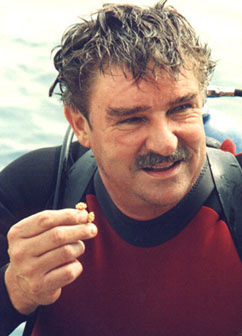Farewell to a Top Treasure HunterContents of this Issue: CoCo View Resort, Roatan, Honduras A Tragic Accident Brings a Reminder for Safe Travel Diver Uses Nasal Spray to Clear His Ears While Underwater: Is That Smart? Spirit of Freedom, Cairns, Australia Can Genetic Engineering Save Coral Reefs? For Some Divers, Waiting Only 24 Hours before Flying Is Not Enough Time Beware of False Prophets on Your Dive Trips How Good Are You at Knowing if a Diver Is Drowning? Murder, Bombing and Mass Destruction in Sabah Farewell to a Top Treasure Hunter When That Dive Training Came In Handy Flesh-Eating Bacteria Strikes in Florida Editorial Office: Ben Davison Publisher and Editor Undercurrent 3020 Bridgeway, Suite 102 Sausalito, CA 94965 from the August, 2019 issue of Undercurrent
His 1972 discovery of the 17th Century Nuestra Seņora de las Maravillas, the second richest Spanish galleon lost in the Americas, got him thrown out of the Bahamas for accusing its then prime minister, Lyndon Pindling, on television of criminal activity, including corruption and taking bribes from drug traffickers. In fact, one of Marx's crew was reported to have stolen two bags of silver coins worth $30,000 off Nuestra Seņora, but although Marx was investigated by the police, he was absolved of any blame. However, he ran into problems with a rival gang of salvagers and was arrested on suspicion of marijuana smuggling by the U.S. Coast Guard. The Bahamas then demanded the return of all the treasure recovered from Nuestra Seņora, and an international incident ensued when Marx refused, under advice from the American Embassy. When the Bahamas threatened to remove access to missile tracking and military bases on its islands, the U.S. government backed down and withdrew its backing of Marx. Meanwhile, other wreck salvage teams were given free rein to excavate the Nuestra Seņora, but Marx never revealed the location of the main section of wreckage he'd discovered but had yet to start work on. Over in Indonesia, the government had long sought the wreck of the Portuguese 400-ton galleon Flor do Mar. When they called in Marx in 1992, he located it within three days -- and more than 100 miles away from the ongoing search area. Marx was born in Pittsburgh, PA. He started what was probably the USA's first diving club (with fellow treasure hunter Mel Fisher), in Los Angeles, and also claimed to have started the world's first dive resort in Cozumel. After a decade living in Spain, where he scoured the Spanish treasure fleet archives and wrote more than 60 books, he returned to live in the U.S., where he eventually died at his home in Melbourne, FL, this past Fourth of July. He was 85. |

I want to get all the stories! Tell me how I can become an Undercurrent Online Member and get online access to all the articles of Undercurrent as well as thousands of first hand reports on dive operations world-wide
| Home | Online Members Area | My Account |
Login
|
Join
|
| Travel Index |
Dive Resort & Liveaboard Reviews
|
Featured Reports
|
Recent
Issues
|
Back Issues
|
|
Dive Gear
Index
|
Health/Safety Index
|
Environment & Misc.
Index
|
Seasonal Planner
|
Blogs
|
Free Articles
|
Book Picks
|
News
|
|
Special Offers
|
RSS
|
FAQ
|
About Us
|
Contact Us
|
Links
|
3020 Bridgeway, Ste 102, Sausalito, Ca 94965
All rights reserved.

 Liked by some and loathed by others, swashbuckler
Bob Marx courted controversy throughout his long diving
career, combining both treasure hunting and marine
archaeology. A sometimes abrasive character, Marx
had a resume that read like Indiana Jones and claimed
discovery of thousands of wrecks in more than 60 countries.
He was best known for excavating the sunken city
of Port Royal in Jamaica.
Liked by some and loathed by others, swashbuckler
Bob Marx courted controversy throughout his long diving
career, combining both treasure hunting and marine
archaeology. A sometimes abrasive character, Marx
had a resume that read like Indiana Jones and claimed
discovery of thousands of wrecks in more than 60 countries.
He was best known for excavating the sunken city
of Port Royal in Jamaica.